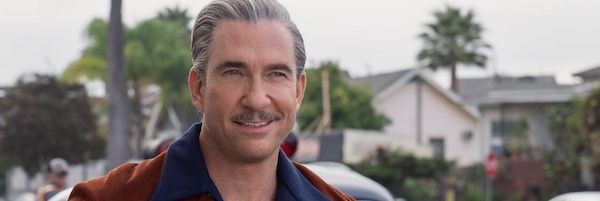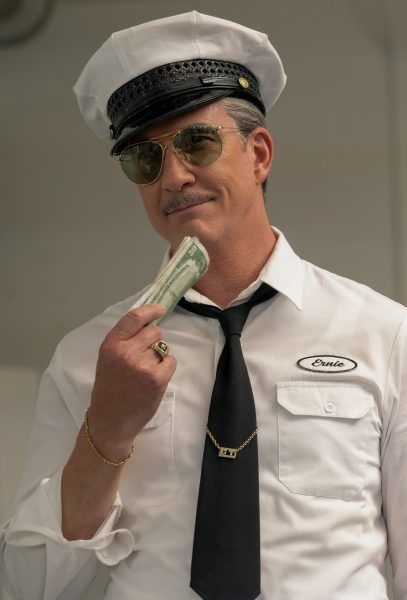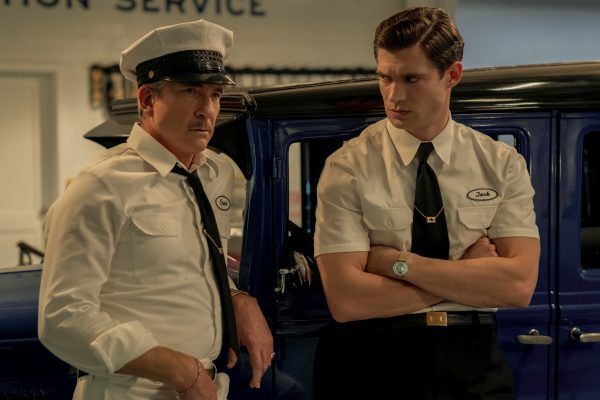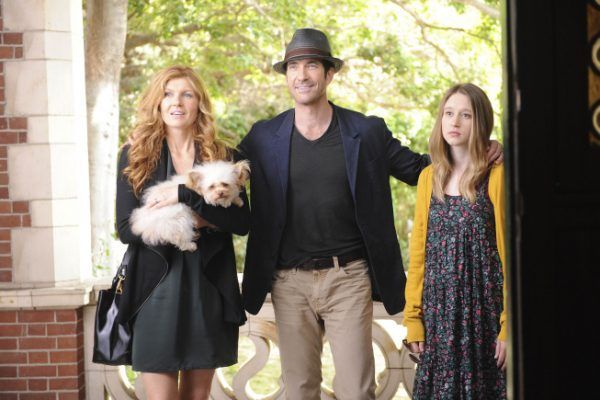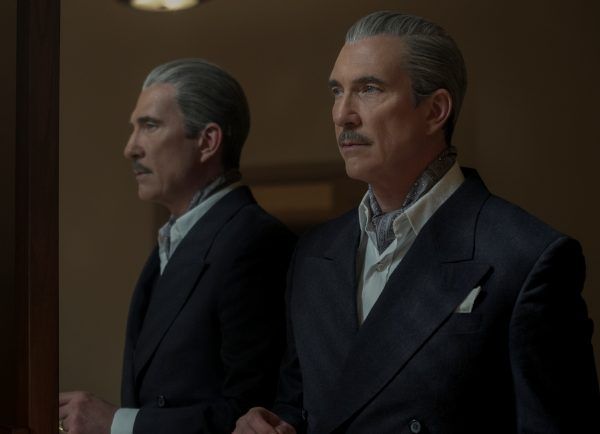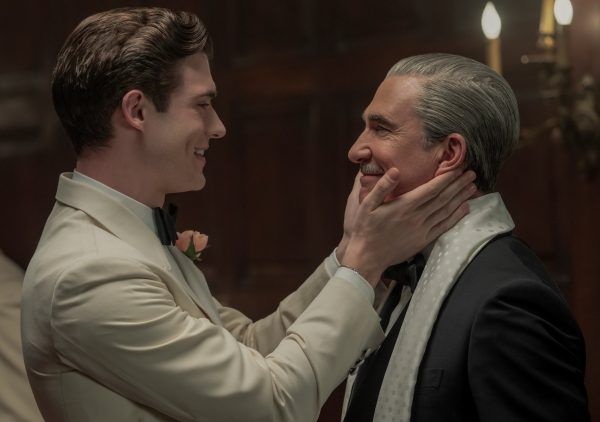With the upcoming award season shining a spotlight on exceptional programming and performances, even though there are a lot of TV shows and various networks and streaming services with countless shows to choose from, there are still some real stand-outs. One such performance is the work of Dylan McDermott in Hollywood as Ernie, the pimp with a heart of gold who wanted to be a movie star himself, but now finds himself surrounded by aspiring actors and filmmakers in post-World War II Hollywood, all trying to make it in Tinseltown.
During this 1-on-1 phone interview with Collider, McDermott gets candid about his own time in Hollywood, why he found Ernie to be such an intriguing character, finding who this guy would be, earning his redemption arc, his collaborative relationship with executive producer Ryan Murphy, how he knew American Horror Story would be a hit, what he and Murphy could team up on next, and much more.
COLLIDER: This seems like a character that must have been a ridiculous amount of fun to play.
DYLAN McDERMOTT: It really was. I have to say that it was some of the most fun I’ve ever had, in my life.
How did you come to hear about this project and character, and what it would be? When Ryan Murphy has another project that he wants you to be in, does he just call you up and tell you what it is? How does that work with him?
McDERMOTT: Yes, pretty much, he calls you out of the blue and says, “I’m writing you a part, which I have to say, besides, “I love you,” are the greatest words an actor could ever hear. So, he said he was writing me this part, and then I didn’t hear from him for awhile. And then, he said, “Come to my office and read the script,” which I did. I was like, “Holy, wow! What?!” And I was just absolutely salivating ‘cause I knew that this was a home run. That’s why you wanna be in business with Ryan Murphy. He supplies these parts that no one else does because nobody thinks outside the box. Everybody just relies on what they’ve already seen. “Oh, you’ve played a lawyer? Maybe he can play a lawyer.” They have zero imagination. And why Ryan is so successful is because he has so much imagination.
When he first told you about this show and the character, what did he tell you? And then, when you got to read the script, was it just the first script?
McDERMOTT: Yeah, it was just the first script. It was the gas station stuff, primarily, and that was completely intriguing to me. And then, it was loosely based on Scotty Bowers, so I did research on him. And then, it wasn’t exactly Scotty Bowers, so we had to form this character and build him, from the ground up. The most interesting thing to me is the building of a character. I love that stuff, more than anything. How you do that is a mathematical problem. Ryan initially wanted him to have a crew cut, and I didn’t exactly see it. I have this poster of Clark Gable in my house, and I used him as my muse, along with Scotty Bowers, to concoct Ernie.
Then, I just started to build building this guy. What kind of food does he eat? What kind of clothes does he wear? What is his hairstyle? What about his underwear? I thought about everything. He was an actor, and he came out here. He has a great line in the show, where he says, “I wanted to be a movie star, too.” Those were little gold nuggets that informed the character. I knew that he had a lot of heartbreak. He wasn’t doing what he wanted to do. He fell into this world, which a lot of people in Hollywood do, when they realize, “Oh, shit, what am I gonna do? I’m not the movie star that I thought.” I felt that the tragedy of Ernie was really interesting, but not to play him as a tragic character. I actually played him as an optimist, so he would work against all of that stuff that’s already inherent. I really enjoyed that. His optimism really blew me away. It’s the boulevard of broken dreams, but nonetheless, there’s a sunny side to him that I really appreciated.
He also gets something of a surprising redemption arc. He’s technically the type of character that you wouldn’t necessarily expect to feel that way for, by the end of the story. How did you feel about that? Was that something that you feel the character earned? Were there conversations that you had with Ryan Murphy, about the initial perceptions of the character versus where he ultimately ended up, and how to get there with the audience?
McDERMOTT: Yeah, because if you look at him on paper, or maybe give him a cursory glance, you would think he’d be a bad guy. You’d think he’s a mustache twirling pimp who’s exploiting these boys. But Ryan and Ian [Brennan] didn’t want to do that. They really, as you said, wanted to give him some redemption. It was that scene outside, with Archie and Jack, where I’m explaining the cookware party and that these guys are some of the great artists of our times. I think that Ernie really had an appreciation for the gays back then, when other people were less tolerant. I thought that was a nice turn for him, right there, in that moment. All of a sudden, he’s not who you thought he was. He’s a pimp with a heart of gold.
You’ve been on this crazy ride with Ryan Murphy, since the first season of American Horror Story, and that was something that was so different from what we’d seen you do, previously. What was it about that first season of American Horror Story that really sold you on his vision for storytelling and on what he could do?
McDERMOTT: I must tell you that I’m a great student. When I was doing movies in the ‘90s, I saw the trend. I watched some television and I knew that I needed to have another vehicle, to get better, as an actor, frankly. I recognized that in David E. Kelley, as a writer, and I went to television when no one else would. It was actually a signal that your movie career was in trouble and it was over. And soon after that, that was the mass exodus from film to television. Then, after The Practice, I knew that, being a good student, I saw all of the actors who had the big television shows and floundered, and never really did anything after that. I was like, “Oh, shit, I’ve gotta play some catch up ball here. I gotta figure this out. What’s my next move? How do I calculate this? What do I do?” So, being the student that I am, I started studying people on television, and Nip/Tuck really caught my eye. I as like, “This guy is special. I wanna work with him.” And then, I was sent the script of American Horror Story, and everybody was really cautious about that, at that time. They were like, “Horror? Television? Who’s Ryan Murphy? FX?” There were a lot of question marks, but I knew.
A couple of times in my life — and it’s only been a handful — I knew that things were gonna be really successful. The Practice was one of them, and it wasn’t, initially. I remember that I was on a curb in Paris, smoking a cigar because we got picked up, but it was on Saturday night, at 10 o’clock at night. I was like, “What?! This is like a graveyard shift.” Eventually, they moved it to Sundays and it became a success. And then, I knew that about American Horror Story. No one was sure about it, but I was completely sure that was gonna be gangbusters, and I even told Ryan as such. But I knew that I had to change. I knew that I had to shed that skin of The Practice guy, and I needed to mix it up hard, for me to survive, as an actor. Ryan Murphy gave me the keys to that kingdom, and I was like, “Hell, yeah, I’m running with this.” And next thing you know, I was crying and masturbating in front of a window.
I remember thinking how uncomfortable that was to watch.
McDERMOTT: How do you think I felt?! I had to do it.
At the same time, I also thought it must be such an interesting opportunity for an actor because it totally breaks any previous typecasting that might have existed.
McDERMOTT: No. I was able to shed the skin of Bobby Donnell and go into Ben Harmon, and that carried me for awhile. That was Ryan. And now, here it is again. I had another re-invention. Ryan said, “I wanna reinvent you,” to me, and he was absolutely right. As an actor, you need to be re-invented, every 10 years, or you’re just gonna be left with some hair products, by the side of the road. And Ryan has been that guy, for me. He’s now re-invented me twice.
With something like this, it almost seems like it’s hard to evaluate a character like this, until you have the ability to look back on it. Now that you can look back on the experience of the show and playing this character and seeing what his whole journey was, what did you most enjoy about that?
McDERMOTT: In many ways, the optimism sticks out the most. I’ve been caught in the leading man world for awhile, and now, I get to play character roles, which I think I’ve always been a character actor, really. The character of Ernie, there’s such a freedom in him. I had a dream where I was tap dancing in the show, and I woke up in the middle of the night and said, “Yes, I wanna tap dance.” So, I got some tap shoes and I learned how to tap, and I said to Janet Mock, “I wanna tap dance in the scene. Is that okay?” And she was like, “Hell, yeah.” I wasn’t sure it was ever gonna make it. It was just on a whim. It was a dream, if you will. And the next thing I know, I’m tap dancing on set, and then it’s in the show. So, this guy was just inspired, man. He just inspired me to do so much. There was a life force to him that’s different than Dylan. He taught me a great deal about life and optimism, that maybe Dylan has less of than Ernie.
What was it like to also get to work with Holland Taylor again and share screen time with her, in this way?
McDERMOTT: I loved and continue to love Holland, as a person and as an actress. My time with her on The Practice, she was just so phenomenal and so rooted and grounded. I love the way she works. She asks so many questions. I have to say, this was one of my favorite scenes that I’ve ever shot. There’s something so beautiful about this scene. There’s a beauty in it that really resonated with me, with this idea of love late. He’s dying, but nonetheless, they’re gonna love each other for however many days they have. There’s a real beauty about that. That just really touches my heart, and that seemed just was so effortless.
You did Hollywood and American Horror Story: 1984, at the same time. What was that like? How did that schedule work? Was it ever weird or challenging to juggle two very different worlds like that?
McDERMOTT: I have to say that it was probably the happiest I’ve ever been, as an artist, using both sides of my brain for two wildly different characters, to have this serial killer hitchhiker and weirdo fan of serial killers, and then to play the pimp with a heart of gold, and to go back and forth and two Ryan Murphy productions. It just doesn’t get any better than that. And I was well aware of that, and grateful and happy, and just pleased as punch, to be on both sets.
Your daughter is also in Hollywood. How did that come about? Did she know about the project because you had talked to her about it and she specifically wanted to be a part of it, or had she been a fan of your work with Ryan Murphy, overall?
McDERMOTT: Well, she had come to the set of American Horror Story, that first season, quite a bit. She would come with her friends and stare at Evan [Peters]. Ryan had met her a few times, and then we all had dinner, so he was aware of Coco. She said, “I have an audition for Hollywood.” I said, “That’s fantastic. Go in and do it.” She did it all on her own, by the way. Ryan was kind enough to cast her, but it was all her. She went, and she’s a fabulous actress. I’ve worked with her on so many auditions. I’m always on the other side of the camera, with her. I’ve seen her do a play in New York, so I know that she has the goods. That’s something that you dream of. Here I am on, on this set with my daughter, all of these years later. I never even dreamed of that, by the way. It was really another gift that Ryan Murphy gave me.
Have you had conversations with him recently about what the next project could be, once production starts up again?
McDERMOTT: Well, I don’t know if you’ve heard, but he’s allegedly developing a show for Leslie Jordan and myself. So, that’s in the mill, if you will. And then, Hollywood hasn’t gotten picked up for a second season, as of yet, so it’s just waiting to see what happens, really. But the truth is, I’m happy to work with Ryan on whatever. I said to him that I could spend the rest of my days, just working for him, and I could die a happy man.
There’s a lot of talk in this series about the dream of making it in Hollywood. When you started on this career path, what did that dream of making it and achieving success look like to you, and what do you think that younger you would think of the career that you’ve had, since then?
McDERMOTT: Wow. Sometimes it’s better to be young and dumb. If you knew everything that was going to happen, maybe you wouldn’t do it. There are a couple of moments that stick in my head. One is when I was staying at the Sunset Marquis and Roy Scheider had this tall glass of orange juice, and he was so tan. He looked impeccable, and he dove into the pool at the Sunset Marquis. And I was like, “Jesus, is that what a movie star does?” I used to wait on actors, as a kid, and I waited on John Belushi. My father managed a bar, and I waited on Matthew Broderick, who I worked with on Broadway, and Michelle Pfeiffer, who I ended up buying her house in Brentwood. I had worked with actors, and I’ve always been enamored of them because I noticed how people treated them differently. I was like, “Oh, man, this is pretty cool. People treat these people a lot different than regular people. Break me off a piece of that.”
That was the initial seduction of Hollywood, before getting my first movie, and then coming out here. I remember having a long talk with myself, when I was a young man saying, “It’s gonna be a long haul, it’s gonna be hard, and it’s gonna be difficult. You will have to persevere and you will have to just work your ass off, to get where you wanna be.” What I meant by that is what my barometer is, and not by Hollywood standards of your name and lights. It was more of what I wanted, as an actor. And my acting teacher, Sanford Meisner, said it would take me 20 years to become a great actor. I actually think he was wrong. It took me 30. So now, it’s 30 years later, and I think Ernie is proof of my craft, as an actor. It shows how diligent I am, as an actor. It’s taken me a hell of a long time to arrive where I wanted to be, and Ernie really is proof of that.
Hollywood is available to stream at Netflix.

